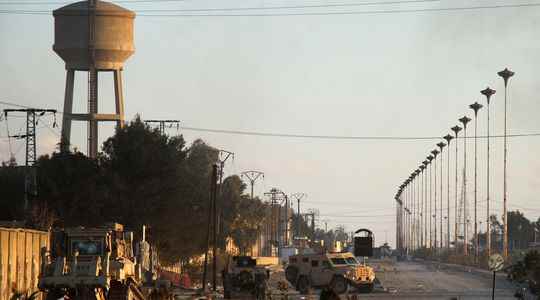373 dead, including 268 jihadists, 98 members of the Kurdish forces and seven civilians. The results of the attack on the Ghwayran prison in Hassaké, carried out by the Islamic State group on January 20 to free prisoners, are particularly severe.
After six days of intense clashes between jihadist fighters and Kurdish forces in Syria, the latter finally announced on Sunday, after several days of sweeping, the end of the operations to control the area. According to the OSDH, twenty jihadists surrendered overnight from Saturday to Sunday.
The attack is the group’s largest offensive since its territorial defeat in Syria in 2019 by Kurdish forces. These actions in Syria but also in Iraq – almost simultaneously, on January 22, the group attacked a military base in the country, killing eleven Iraqi soldiers – “demonstrate that IS still has the will to strike to reconstitute these operational bases and the capacity for attacks”, analysis for L’Express Jean-Charles Brisard, president of the Center for the Analysis of Terrorism (CAT).
L’Express: How can I explain the attack on this prison by IS?
Jean-Charles Brisard : The building is under the control of the Syrian Kurdish forces, unlike other prisons which are under the control of the coalition and ultra-secure, where the French jihadists are detained for example. That of Ghwayran is considered less protected.
In terms of propaganda, there was real emulation on social networks after this attack and there is a very important stake for IS in having these detainees released, a very strong symbolic significance, already because the last leader of the organization, Abu Bakr al-Baghdadi, had called on his supporters to release the detained jihadists. On the other hand, there is a rapprochement made with Guantanamo. These camps and prisons, where detainees have not been tried for three years, act as a focal point for propaganda that plays in favor of IS.
What do these recent attacks in Syria and Iraq teach us about the operational capabilities of the jihadist group?
We already knew that the Islamic State was resilient and was rebuilding its operational capabilities in Iraq and Syria, even if they were largely degraded. The group has retained operational units that have been hitting regularly and locally for three years. The novelty of the attack on Ghwayran prison is the demonstration of coordination between capacities outside the prison and the inmates locked inside. There was an uprising inside the prison, as has happened five times over the past two years, but this time it was in conjunction with the outside.
What are IS’s activities in the Iraqi-Syrian zone?
Large-scale localized attacks have been carried out for three years in Syria, we observe that the capacities remain so as to carry out symbolic attacks and this responds to the importance of releasing those who are detained, in prisons or in detention camps, as is the case for the wives of jihadists.
In Iraq, the IS acts in a more clandestine way but it retains a strong capacity for mobilization and action in these areas which remain fallback or support areas for the group, which then retains points of support in this region.
The risk is twofold. These attacks demonstrate that IS still has the will to strike to rebuild these operational bases and the capacity for attacks that can ultimately lead to the release of jihadist detainees. There is therefore a risk of these detainees escaping, and the risk of the reconstitution of capacities, with, for some of them, and in particular the Europeans, the desire to strike their country of origin. What we can fear is the multiplication of this type of action. IS will again attempt to release detainees in other prisons or detention camps.
Moreover, there is a real risk of destabilization in the area, we see it in this context on a local scale, but IS is clearly seeking to strengthen its capacities and prove its presence on the ground. The famous dormant cells are actually very active. And without the help of American forces in support of the Kurds, the scenario would probably not have been the same in the end.
Can repatriation be a solution?
This indeed proves the need to repatriate these people, for humanitarian reasons on the one hand concerning the children on the spot, but also for security and legal reasons. At the moment there is the trial of the attacks of November 13, and we are depriving ourselves of testimonies from the wives of terrorists, from people aware of the attacks, it is prejudicial to the bursting of the truth. There have already been cases of escape from prison, and especially of the wives of jihadists from detention camps. A dozen French women have already escaped.
We are therefore taking a risk by deciding to leave them there and we are depriving ourselves of important elements in the judicial investigations. Nevertheless, the question has not evolved and is absent from the presidential debates. She could invite herself into the discussions if the French were to escape as well.
